How to Wash the Body:
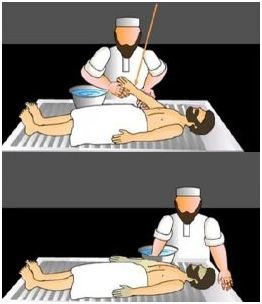
- Begin with istinja’ (washing the private parts), if any urine or stools have been expelled. The washer should place a cloth over his hand and wash away any dirt from the back and front passage, pouring water over it. He should also cover the area between the navel and the knees so that it cannot be seen.
- Then do wudu for the deceased, wiping the mouth and nose with water, washing the face and arms, wiping the head and ears, and washing the feet.
- Then pour water containing lotus leaves over the head, then over the right side, then over the left side, then pour water all over the body. In the final washing he can also add camphor to the water, which is a well-known perfume that strengthens the body and gives a pleasant fragrance.
This is the best way, but any manner of washing is acceptable. What matters is that water should reach the entire body and remove any dirt. It is also recommended to wash the body with water and lotus leaves three times, then pour water over the body, three times on the right side and three times on the left. If there is a need to do that more than three times, then it should be five times; if there is a need for more than that, then it should be seven times. It should be an odd number of times; this is preferable.
How to Pray the Janazah (funeral) Prayer:
1 – Say first Takbeer (‘Allahu Akbar’) and raise both hands up to your earlobes and then place your right hand over your left hand
2 – Seek refuge from the Shaytan (devil)

3 – Recite Surah Al-Fatihah followed by a short surah or part of a surah
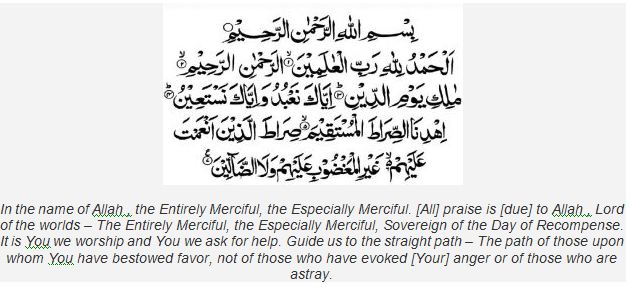
4 – Say second Takbeer. You can either choose to raise your hands again up to your earlobes or leave them as is. Both are permissible.
5 – Recite Darood on Prophet Muhammad (pbuh) as one does at the end of the prayer
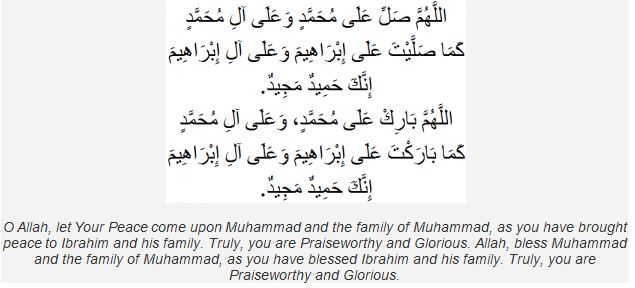
6 – Say third Takbeer. You can either choose to raise your hands again up to your earlobes or leave them as is. Both are permissible.
7 – Make supplications for the deceased. There are a number of recommended supplications from the Prophet (pbuh). Following is the most popular:
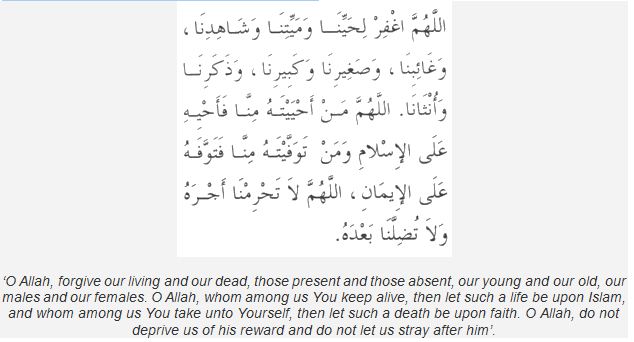
8 – Say fourth Takbeer and pause for a little while. You can either choose to raise your hands again up to your earlobes or leave them as is. Both are permissible. Some scholars say to recite general supplications for yourself, family, friends, and all Muslims during this period.
9 – Then end by saying one Tasleem to the right (‘Assalaamu ‘alaykum wa rahmat-Allaah’). Doing it on both sides as in regular prayer is also ok.
Muslim Way of Burial:
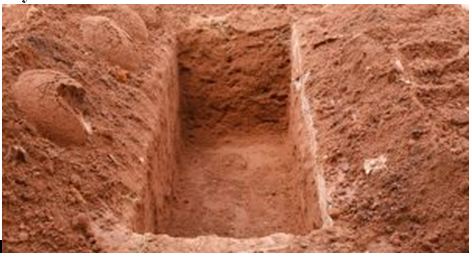
The Sunnah is to put the deceased into the grave from the end, then he should be turned onto his right side in the grave, with his face facing towards the qiblah. The one who puts him into the lahd (niche in the grave) should say:

“Bismillaahi wa ‘ala sunnat Rasool-Allaahi or ‘ala millat Rasool-Allaahi”
In the name of Allah and according to the Sunnah of the Messenger of Allah or according to the religion of the Messenger of Allah (peace and blessings of Allah be upon him)).
(Narrated by al-Tirmidhi, al-Janaa’iz 967; classed as saheeh by al-Albaani in Saheeh Sunan Abi Dawood, 836)
It is mustahabb for those who are at the grave to throw handfuls of earth, three handfuls scooped up in both hands, after the lahd has been sealed.
After the burial is complete, there are several things which are Sunnah:
- There is nothing wrong with placing a marker such as a stone or something similar, so that others of his family may be buried near him later on.
- Water should be sprinkled on the grave so that the soil will settle and not fly around.
- People should stand at the grave and pray for the deceased to be made steadfast and pray for his/her forgiveness. Those who are present should be told to do this, because of the hadeeth of ‘Uthmaan ibn ‘Affaan (may Allah be pleased with him), who said: “When the deceased had been buried, the Prophet (peace and blessings of Allah be upon him) would stand by (the grave) and say: ‘Pray for forgiveness for your brother and ask for him to be made steadfast, for even now he is being questioned’” (Narrated by Abu Dawood, al-Janaa’iz, 2804; classed as saheeh by al-Albaani in Saheeh Sunan Abi Dawood, 2758).
- It is prescribed in Islam to offer condolences to the family of the deceased. This should take the form of whatever is thought will bring them consolation, stem their grief and help them to be patient. The Sunnah is for the relatives and neighbours of the deceased to make food enough for the bereaved family.
